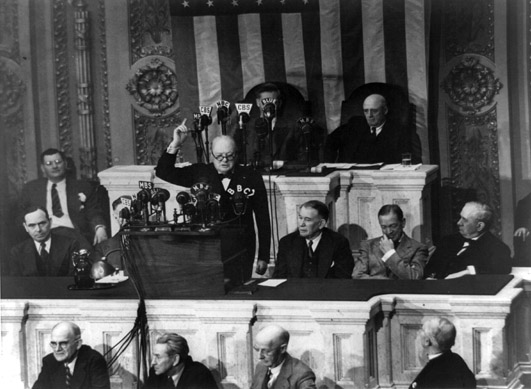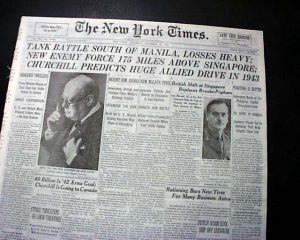
Churchill’s 1943 Speech to Congress
A friend writes asking for the audio of Churchill’s second of three speeches to Congress, and poses a question: “Roosevelt attended neither the 1941 nor 1943 speeches. Why not?”
Click here for clear audio of the 50-minute speech.
Presidents never attend speeches to Congress by foreign heads of state or government. Part of this is certainly courtesy, so as not to steal focus from the guest. In a deeper sense, it is an assertion of the separation of powers between Congress and the Executive. A similar tradition in Britain is when the House of Commons slams the door on Black Rod, when he summons Members to the House of Lords to hear the Queen’s Speech. He then bangs the door again, three times. Members of Commons walk out, talking loudly, and troop to the Lords to hear the speech. The ritual emphasizes Commons’ independence.
Not a P.C. Congress
Churchill and his party, he said,
have not travelled all this way simply to concern themselves about improving the health and happiness of the Mikado of Japan. I thought it would be good that all concerned in this theatre should meet together and thrash out in friendly candour, heart to heart, all the points that arise; and there are many.
Anywhere war industry was concentrated was fair game, Churchill told Congress. If there were populations around it, they would be well advised to leave:
If they do not like what is coming to them, let them disperse beforehand on their own. This process will continue ceaselessly with ever-increasing weight and intensity until the German and Italian peoples abandon or destroy the monstrous tyrannies which they have incubated and reared in their midst….
It is the duty of those who are charged with the direction of the war to overcome at the earliest moment the military, geographical, and political difficulties, and begin the process, so necessary and desirable, of laying the cities and other munitions centres of Japan in ashes, for in ashes they must surely lie before peace comes back to the world.
 Dear oh dear, how terribly bullying. How arrogant, insensitive and warlike! But those sentiments were not heard. Members of Congress and American audiences reacted with cheers. The New York Times headlined, “Churchill Predicts Huge Allied Drive in 1943.”
Dear oh dear, how terribly bullying. How arrogant, insensitive and warlike! But those sentiments were not heard. Members of Congress and American audiences reacted with cheers. The New York Times headlined, “Churchill Predicts Huge Allied Drive in 1943.”
It was, of course, another age. This was the last war in history declared by Congress. And Churchill knew, as he wrote in his memoirs, that “the United States was in the war, up to the neck and in to the death…. We should not be wiped out. Our history would not come to an end. We might not even have to die as individuals.”
How times have changed
Having located and listened to the online audio, I had an odd sensation. It wasn’t over the classic Churchill peroration. Most of all I was struck by the announcer. He reminded me how much has changed.
The announcer is full of hyperbole, patriotism and praise, totally unquestioning of the speaker. It is so different from how one expects a speech like that would be covered today. One can imagine the media talking heads at the end of it: “Finally we switch to Berlin for Herr Goebbels’ response…..”
My friend in England quips: “The BBC would give out a hotline number for counseling to those disturbed by what they have heard.” Certainly many groups would be “offended.”
In another wartime speech, in Canada, Churchill declared: “We have not journeyed all this way across the centuries, across the oceans, across the mountains, across the prairies, because we are made of sugar candy.”
Let us hope that is still true.







2 thoughts on “Churchill’s 1943 Speech to Congress”
The Windsors visited the States several times while he was Governor of the Bahamas (1940-45), and their third visit began 9 May 1943. The Duke visited Bahamian laborers in Florida and New Jersey, spoke to General Foods about Bahamas operations, and met with British colonial officials in Washington. Churchill, who had holidayed with FDR at what is now Camp David, addressed Congress on 19 May. The Windsors attended in the diplomatic gallery. Michael Bloch, in The Duke of Windsor’s War, records that Windsor got more applause than Churchill, disconcerting the latter. They met twice, once with the President, talking about the war and Windsor’s future. The Duke wanted to be assured he’d done well in the Bahamas. (He hadn’t done well, which I know from local sources as a part-time Bahamian resident.)
Churchill smoothed his feathers, promised he’d look for something for him to do, and later offered him the governorship of Bermuda (a promotion from the Bahamas, then considered the worst governorship in the Empire). Windsor refused: “I can’t see much point in island-jumping. I’m for the big hop to a mainland.” A mainland job he never got. Bloch believes Churchill never lost “his respect and sympathy for his former King [and] his expressed desire to improve his lot.” But Churchill after all depended strongly on his friendship with the King and Queen, who had despised the Windsors since the Abdication. And so the Duke wasted away, an exile, to the end of his life. It was, really, his own doing. As Alistair Cooke said, “He was at his best only when the going was good.” (See “Alistair Cooke: An Introduction and an Appreciation.”)
Have just seen newsreel Churchill’s 1943 speech to American Congress. Can anyone tell me why Edward and Mrs. Simpson were doing there, in what looks like prime seats? Churchill had no time for them.
Comments are closed.